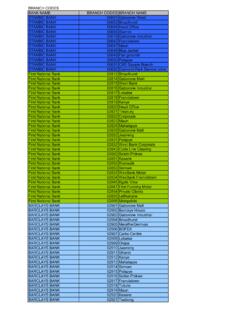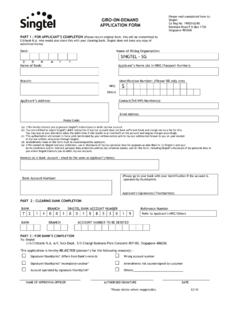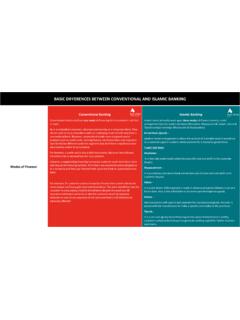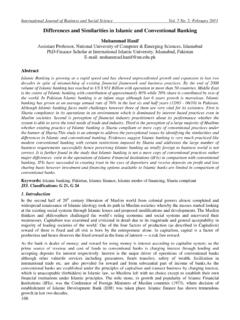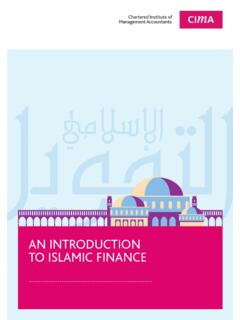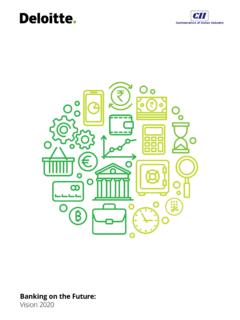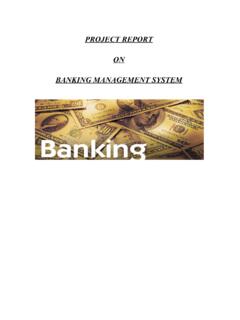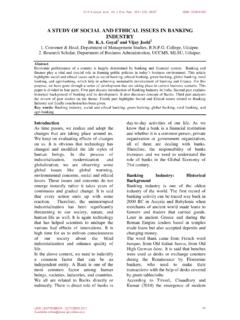Transcription of Differences between Islamic Banking and Conventional ...
1 Differences between Islamic Banking and Conventional Banking Offerings Deposit / Liabilities CASA & Term Deposit Conventional banks accept deposits on the basis of loan for all types of deposit accounts including Term Deposit, Savings and Currents accounts. Interest based returns are provided for the Savings accounts and Term Deposits, whereas Current Accounts may offer free Banking facilities. In addition to this, Conventional bank invests the deposits in non-shariah compliant avenues and subsequently earns non-shariah compliant returns. Islamic Banks offers deposit products based on the following structures: 1.
2 Qard Current accounts are offered under this contract where the risk of the funds lies with the bank and no added benefits are provided to the client solely based on this facility. However, clients may be allowed to avail those facilities which are offered across the board. 2. Mudarabah a type of partnership where client funds are invested in various businesses and returns are shared between the bank and client as per the agreed profit sharing ratio whereas, the loss is shared as per the investment ratio. Term Deposit and Savings Accounts are offered on the basis of Mudarabah. Lending / Financing Conventional banks offer lending facilities to their clients to fulfil their cash requirement on the basis of loan contracts where the relationship between the Bank and client is that of lender and borrower respectively.
3 Conventional Banking Loan Contracts Characteristics: 1. No risk of underlying assets 2. Income through Interest 3. Late Payment charges on delayed payments and shall constitute bank s income. Islamic banks offer financing/leasing facilities to their clients to fulfil their business requirements on the basis of following contracts depending on the requirements of the client: Islamic Banks Financing Transactions Characteristics: 1. Islamic bank takes the risk of the asset 2. Income is earned through sale or leasing contracts 3. Share profit & bear Loss as the case may be 4. In case of late payment or default by the client, there will be no penal charges.
4 However, to instil a payment discipline, Bank is authorized to recover an amount at a predetermined percentage as compulsory contribution to Charity Fund constituted by the bank approved Shariah Board. This contribution to Charity Fund shall not constitute income of the bank. 5. The bank will deploy the Islamic Funds in only Shariah Compliant avenues. Following are the Saadiq financing products along with their relevant financing structures: 1. Saadiq Home Finance Structure: Diminishing Musharakah A long term transaction where the bank and the client mutually own an asset and bank earns returns through leasing the asset to the client.
5 In addition to this, periodically client purchases the bank s share and gradually becomes the complete owner of the asset. 2. Saadiq Credit Cards Structure: Ujrah A contract of services, where the bank charges for the provision of associated privileges and benefits. In addition to this, no extra amount is charged over the 2 credit limit utilized by the client. Saadiq Credit Card restricts usage services at Non-Shariah Compliant merchants. 3. Business Term Finance Structure: Diminishing Musharakah Sale & Leaseback - DM SLB A medium to long term transaction where the bank purchases the partial ownership from the client and jointly owns the asset with the client.
6 Client pays the rentals for using the bank s share and periodically starts purchasing the bank s share after a completion of a 12 months period to avoid buy back (which is not allowed as per Shariah). Immediately after the completion of gradual purchase of share client becomes the complete owner of the asset. 4. Commercial & Trade Saadiq Murabaha Finance Structure: Murabaha Sale based transactions where bank purchases the asset and bears the risk and reward of the asset and subsequently sells it to the client after adding a certain profit. Saadiq Term Finance Structure: Diminishing Musharakah A medium to long term transaction where the bank purchases the partial ownership from the client and jointly owns the asset with the client.
7 Client pays the rentals for using the bank s share and periodically starts purchasing the bank s share after a completion of a 12 months period to avoid buy back (which is not allowed as per Shariah). Immediately after the completion of gradual purchase of share client becomes the complete owner of the asset. Saadiq Term Musharakah and Overdraft Structure: Musharakah Musharakah based structure where the bank invests the funds in the clients business on a profit and loss sharing basis. The Bank can take profit on provisional payment basis which would be subject to adjustment when the client s financial statements are published 3 Trade Finance Conventional banks offers trade finance related operations under the concepts of services, guarantee and lending.
8 Conventional Banks Trade Transactions Characteristics: 1. Commission based Income 2. Income through guaranteeing payments 3. Income through Interest on loan payments 4. Additional interest income on delayed payments Islamic banks also offer trade finance related operations under the concepts of services, guarantee and financing with the following conditions: Islamic Banks Trade Transactions Characteristics: 1. Commission based Income as per the guidelines of Shariah 2. Income through payment and documents facilitation services 3. Income through sale or lease of assets 4. Share Profit & bear Loss as the case may be 5. In case of late payment or default by the client, There will be no penal charges.
9 However, to instil a payment discipline, Bank is authorized to recover an amount at a predetermined percentage as compulsory contribution to Charity Fund constituted by the bank approved Shariah Board. This contribution to Charity Fund shall not constitute income of the bank. 6. The bank will deploy the Islamic Funds in only Shariah Compliant avenues. Following are the Saadiq trade finance products along with their relevant financing structures: 1. Saadiq LC Issuance and Import Finance Under Murabaha Structure: Murabaha under Agency Saadiq appoints the client as undisclosed agent to import the goods through LC arrangement and sells the goods to the client after disclosing the cost and profit at the time of receipt of goods 2.
10 Saadiq LC Issuance Under Kafalah Structure: Kafalah Saadiq facilitates the client to import the goods and only guarantees the payment to the supplier in case of a default from the client as per the concept of Kafalah. Service charges will be levied to the client to cover the following expenses Credit assessment procedures, Operational procedures and Processing and issuance procedures. Further, Service charges will be obtained as a fixed percentage of the LC amount based on the duration of the LC. 3. Saadiq Import Invoice Financing Structure: Murabaha under Agency Saadiq appoints the client as undisclosed agent to import the goods and sells the goods to the client after disclosing the cost and profit at the time of receipt of goods 4.


